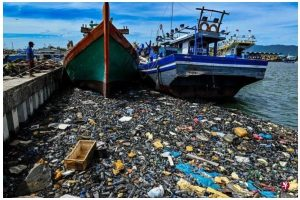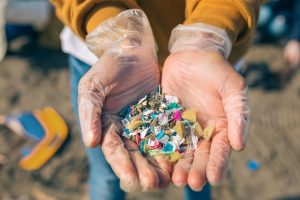News
Indonesia will completely ban single-use plastic products, including polystyrene foam used to hold food, single-use plastic straws, plastic cutlery, and plastic shopping bags by the end of 2029.
In making the announcement on Monday (June 5), Indonesia's Environment and Forestry Minister Siti said, "This is a way to deal with packaging waste that is difficult to collect and recycle, has no economic value, and has the potential to pollute the environment."
Indonesia is one of the countries that produce the most plastic waste in the world. In 2022, Indonesia, with a population of 270 million, produced 12.6 million tons of plastic waste, equivalent to 46.7 kilograms per person, according to official figures.
According to a study by environmental organization Zero Waste Indonesia, only 9 percent of Indonesia's plastic waste is recycled, while the rest is either disposed of in landfills or flows into rivers and oceans.

Indonesia faces a serious problem of garbage polluting the sea. Pictured is a seaport in Banda Aceh, Sumatra. (AFP)
Sitti revealed that the central government will ask the provinces to prepare a roadmap to reduce plastic waste in order to implement the ban.
She also emphasized that the private sector should play a role in reducing plastic waste. She asked all manufacturers to reduce the use of plastic packaging by 30 percent by 2029 in order to reduce the downstream plastic waste problem.
In order to reduce the use of plastic, the Indonesian government has introduced several regulations on the subject. For example, the authorities in 2019 mandated that plastic producers must develop a roadmap for their products to reduce manufacturing waste, among other things.
Other Southeast Asian countries are also trying to deal with the plastic waste problem. The Malaysian government announced in May that it plans to completely ban the use of plastic bags by merchants by 2025 at the latest.

On the other hand, the Philippines creates 60,000 metric tons of solid waste per day, up from 16,000 metric tons in 2016. Of these 60,000 metric tons of solid waste, 30 to 40 percent are plastic waste.
Philippine Environment and Natural Resources Secretary Loizaga said on Monday that the Philippines has failed to win the battle to reduce the use of single-use plastics." There is a social problem involved, and if you cannot deal with that social problem, we will not be able to address the use of single-use plastics." She also urged large corporations that use plastic packaging to take responsibility for finding sustainable alternatives.
Thailand also faces the same problem of plastic waste polluting the oceans. A total of 25.7 million tons of solid waste was generated in 2022, up 2.8 percent year-on-year, according to Thailand's Pollution Control Department. The problem is compounded by the use of single-use plastic packaging due to the prevalence of takeaways and online shopping. The Pollution Control Department predicts that the total amount of waste in Thailand will continue to increase as the number of tourists steadily rises.
Thong Tangrongnavasavat, a marine ecologist at the Faculty of Fisheries at the Agricultural University of Thailand, said:- "An important way to tackle marine litter is to develop mandatory waste management, impose a fee on companies producing low-degradable waste, and increase the competitiveness of degradable and recyclable products in the marketplace."
The Thai government has launched an action plan on waste management aimed at phasing out single-use plastic products and Polytron food packaging, and will also ban all plastic waste imports from 2025.
 +86 189 2452 1063
+86 189 2452 1063 s-dzhiyuan@163.com
s-dzhiyuan@163.com 18924521063
18924521063




Online Message

Follow Us


Top